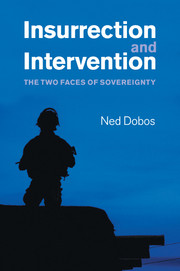Book contents
- Frontmatter
- Contents
- Acknowledgements
- Introduction
- Chapter 1 Communal self-definition
- Chapter 2 Costs and consequences
- Chapter 3 Asymmetries in jus ad bellum
- Chapter 4 Asymmetries in jus in bello
- Chapter 5 Humanitarian intervention and national responsibility
- Chapter 6 The issue of selectivity
- Chapter 7 Proper authority and international authorisation
- Conclusion
- Select bibliography
- Index
Chapter 1 - Communal self-definition
Published online by Cambridge University Press: 05 November 2011
- Frontmatter
- Contents
- Acknowledgements
- Introduction
- Chapter 1 Communal self-definition
- Chapter 2 Costs and consequences
- Chapter 3 Asymmetries in jus ad bellum
- Chapter 4 Asymmetries in jus in bello
- Chapter 5 Humanitarian intervention and national responsibility
- Chapter 6 The issue of selectivity
- Chapter 7 Proper authority and international authorisation
- Conclusion
- Select bibliography
- Index
Summary
‘Given an illiberal or undemocratic government, citizens are always free to rebel’, writes Walzer, ‘whether they act on that right or not, and whether they believe themselves to have it or not’. This follows naturally from Walzer’s stance on political obligation – the duty to obey directives issued by one’s government. An individual can only be obliged to obey a state whose authority he has consented to, and consent can be registered validly only within a liberal democratic setting:
It is not enough that particularly striking acts of consent be free; the whole of our moral lives must be free so that we can freely prepare to consent, argue about consenting, intimate our consent to other men and women … Civil liberty of the most extensive sort is, therefore, the necessary condition of political obligation and just government. Liberty must be as extensive as the possible range of consenting action – over time and through political space – if citizens can conceivably be bound to a strict obedience.
If we do not owe it to our government to comply with its commands, we cannot be obliged to refrain from resisting when the state attempts to induce our compliance. Thus, insofar as the subjects of illiberal states are under no political obligation according to Walzer, it stands to reason that they are ‘always free to rebel’. As we have seen, this is very much the dominant view. Few would object morally to an oppressed people rising up against their authoritarian rulers in an effort to win the freedoms taken for granted by the citizens of liberal democracies.
But the same cannot be said for the view that all illiberal states are legitimate targets of foreign intervention. For some, a state must honour the full complement of human rights and liberties, or be liberal democratic, in order to enjoy the protection that sovereignty affords. Call this cosmopolitan interventionism. But for most, there is some subset of human rights whose neglect or violation is necessary for the forfeiture of international sovereignty. John Rawls, for instance, argues that moral immunity against intervention is conditional upon a state’s respect for a narrowly circumscribed range of ‘human rights proper’, including the rights to personal security, to the means of subsistence, to liberty from slavery, and to equal treatment under the law. Abuses of this ‘special class of urgent rights’ can permissibly be redressed through foreign intervention, but the same does not apply to freedom of speech and religious practice, freedom of association, the right to an education, and democratic suffrage. For one government to violently coerce another into honouring these rights is, apparently, contrary to the spirit of liberalism. In a similar vein, Walzer argues that armed intervention is a legitimate option only where it is necessary to prevent large scale abuses of the most basic human rights in the form of massacre, enslavement or ethnic cleansing. States limited to ‘ordinary oppression’, although liable to rebellion, retain their sovereign immunity against outside intervention.
- Type
- Chapter
- Information
- Insurrection and InterventionThe Two Faces of Sovereignty, pp. 27 - 45Publisher: Cambridge University PressPrint publication year: 2011



